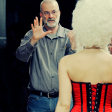Film Speakers
You've got an event coming up and want someone who can speak about storytelling, cinema, or the industry behind the scenes-but not just anyone.
You need someone with experience, charisma, and something fresh to say.
So how do you sort through the noise and find the right film speakers?
Film speakers are directors, producers, critics, actors, or film scholars who know how to connect with an audience.
They bring behind-the-scenes context, creative thinking, and cultural relevance to your event or show.
Whether you're running a creative summit, podcast, panel, or screening series, the right speaker can give your audience a new lens on the art and business of film.
I've seen how the best film speakers don't just talk about movies-they tell stories that shift how people see their own work and the world.
Ready to discover someone who can do that for your audience?
Browse the top film speakers below or book someone who fits your vibe.
Top Film Speakers List for 2026
Christopher Maynard
Uncovering cinema's secrets, one frame at a time
Neal Jones
Independent horror film producer and actor with over 20 years of podcasting experience!
Lisa Giesler
Uncluttered and Finding joy and purpose in life's
Jay Finlayson
Film and tv industry professional with a horror film festival in the works
Jayson Johnson
Award-Winning Film Director | 6 Wins Across 92 Global Film Festivals | Master of Cinematic Storytelling
Christiaan Willems
How to NOT to come across as a 'Complete Dick' in your Business Videos
Chris Miller
Tech gadget and social media privacy enthusiast, reviewer and commentator
Peter D. Marshall
I am a filmmaker and directing coach from Vancouver, now living in Shanghai, with over 50 years of film industry experience.
Derek Koch
Join the monster movie journey of a lifetime!
Frank King
How to make a living speaking, and make a difference
What Makes a Great Film Speaker
Take someone like Ava DuVernay. When she speaks about filmmaking, she doesn't just talk about the technical process-she weaves in her personal journey, the cultural context, and the emotional stakes. That's what makes her unforgettable. A great film speaker brings depth, not just data. They're not there to lecture; they're there to engage.
And it's not just directors. Editors, cinematographers, even location scouts can be phenomenal speakers when they frame their experience in a way that's accessible and compelling. Think of a colorist explaining how they used a specific palette to evoke nostalgia in a coming-of-age film. That's gold for an audience hungry to understand the magic behind the screen.
But here's the kicker: authenticity trumps polish. You don't need a TED Talk-level performance. You need someone who's real, who's passionate, and who's willing to share the messy, behind-the-scenes truth. That's what sticks with people long after the event ends.
So if you're looking for a great film speaker, don't just chase the biggest name. Look for the one who can tell a story that matters-and tell it like it's the first time they've ever shared it.
How to Select the Best Film Speaker for Your Show
1. Define Your Audience and Goals
- Are you hosting a virtual summit for indie filmmakers? Or a local screening for high school students? Knowing your audience helps you match the speaker's tone, experience, and content.
- Tip: If your audience is mostly aspiring directors, look for speakers who can break down the creative process or share career-building insights.
2. Identify the Format and Role
- Will the speaker be giving a keynote, joining a panel, or leading a workshop? Different formats require different strengths.
- Example: A charismatic storyteller might shine in a keynote, while a seasoned editor might thrive in a technical workshop.
3. Browse Platforms Like Talks.co
- Use tools like Talks.co to explore speaker profiles, past talks, and reviews. You can filter by topic, experience level, and availability.
- Bonus: Talks.co also connects hosts and speakers directly, saving you time on outreach.
4. Check for Alignment
- Watch clips or listen to podcast interviews. Do they speak with clarity? Do they connect emotionally? Are they aligned with your event's tone?
- Pro Tip: Look for speakers who've addressed similar audiences before. Their experience will translate better.
5. Reach Out with a Clear Ask
- When you contact them, be specific. Share your event's purpose, audience size, format, and what you're hoping they'll deliver.
- Keep it short, but make it personal. Mention why you think they're a good fit.
By following these steps, you'll not only find a speaker-you'll find the right voice to elevate your entire show.
How to Book a Film Speaker
1. Start with Research
- Use platforms like Talks.co to browse verified film speakers. You can filter by genre expertise, availability, and speaking style.
- Look for speakers who've been active recently-those with fresh content and current insights tend to engage better.
2. Create a Shortlist
- Narrow it down to 3-5 potential speakers. Consider diversity in background, perspective, and storytelling style.
- Tip: Include at least one emerging voice. Newer speakers often bring fresh energy and are more flexible with scheduling.
3. Reach Out Professionally
- Send a concise, personalized message. Include event details (date, format, audience), compensation (if any), and why you chose them.
- Example: "Hi [Name], I'm hosting a virtual panel for indie filmmakers on [date]. Your talk on visual storytelling really resonated with our theme. Would you be open to joining as a guest speaker?"
4. Confirm the Details
- Once they agree, lock in the logistics. Confirm time zones, tech setup (Zoom, StreamYard, etc.), and session format.
- Don't forget to send a calendar invite and a prep doc outlining expectations, audience profile, and any Q&A plans.
5. Promote and Prep
- Feature the speaker on your event page and social media. Use their bio and headshot (with permission).
- Schedule a quick pre-event call to align on flow and answer any questions.
Booking a film speaker is all about clarity, communication, and creating a win-win. When done right, it sets the tone for a memorable session.
Common Questions on Film Speakers
What is a film speaker
A film speaker is someone who shares insights, stories, and expertise from the world of filmmaking in a public or educational setting. They might be directors, producers, screenwriters, editors, or even film critics-anyone with meaningful experience in the industry who can articulate it to an audience.
Unlike traditional keynote speakers, film speakers often blend technical knowledge with creative storytelling. They might break down how a scene was shot, explain the evolution of a script, or discuss the social impact of a documentary. Their goal is to inform, inspire, and sometimes challenge the audience's understanding of cinema.
Film speakers can appear at festivals, virtual summits, university panels, or niche events like horror film conventions or international animation expos. Their talks can range from deep dives into cinematography to broader discussions on representation in media.
In short, a film speaker is a bridge between the screen and the audience-someone who pulls back the curtain and invites others into the world of filmmaking.
Why is a film speaker important
Film speakers are crucial because they contextualize the creative process. They help audiences understand not just what was made, but why and how it was made. This is especially powerful in educational settings, where aspiring filmmakers are hungry for real-world insights.
Consider a documentary filmmaker discussing how they gained access to a sensitive subject. Or a screenwriter explaining how a cultural nuance shaped a character's arc. These aren't things you learn from watching the movie alone-they come from lived experience, shared through intentional storytelling.
In global contexts, film speakers also bring regional perspectives that challenge dominant narratives. A speaker from Nollywood or Korean cinema, for example, can offer a completely different lens on storytelling, production, and audience engagement.
Ultimately, film speakers elevate the conversation around cinema. They turn passive viewing into active learning, and that shift can inspire the next wave of creators, critics, and changemakers.
What do film speakers do
Film speakers educate, entertain, and engage. They might give keynote talks at film festivals, lead workshops on screenwriting, or participate in panel discussions about industry trends. Their job is to translate their behind-the-scenes experience into something meaningful for an audience.
Here's a breakdown of what film speakers typically do:
- Deliver Talks and Keynotes. They speak on topics like storytelling, directing, cinematography, or the business of film.
- Lead Workshops and Masterclasses. These sessions dive deeper, offering hands-on guidance to aspiring filmmakers.
- Participate in Panels and Q&As. Film speakers often join group discussions to share diverse perspectives on a theme or genre.
- Mentor and Inspire. Especially in educational or nonprofit settings, film speakers often take on a mentorship role.
- Advocate for Change. Many use their platform to speak on issues like diversity in film, ethical storytelling, or industry reform.
Whether they're breaking down a complex visual effect or sharing the emotional journey of making a documentary, film speakers help audiences see cinema not just as entertainment, but as a craft, a culture, and a conversation.
How to become a film speaker
1. Define Your Niche
- Are you focusing on directing, screenwriting, cinematography, or film history? Get specific.
- Example: A speaker specializing in indie film production will have a different audience than someone focused on Hollywood blockbusters.
2. Build Credibility
- Speak at local film festivals, university film programs, or virtual summits.
- Create a Talks.co speaker page to showcase your expertise, past talks, and testimonials.
- Publish articles or videos on platforms like Medium or YouTube to demonstrate thought leadership.
3. Craft a Signature Talk
- Develop a compelling presentation that solves a problem or inspires action.
- Tip: Use storytelling techniques from the film world itself. People love behind-the-scenes insights.
4. Network with Event Hosts
- Use platforms like Talks.co to connect with summit organizers and podcast hosts.
- Reach out directly to film schools, production companies, and industry events.
5. Promote Yourself Consistently
- Post clips of your talks on LinkedIn, Instagram, and Twitter.
- Build an email list to keep your audience engaged and informed about upcoming events.
6. Keep Improving
- Ask for feedback after every talk.
- Watch top film speakers and analyze their delivery, structure, and audience engagement.
Becoming a film speaker isn't about being famous. It's about being valuable, visible, and vocal in your niche.
What do you need to be a film speaker
Industry Expertise: Whether you're a director, critic, academic, or producer, your credibility comes from experience. That could be years on set, a film degree, or a portfolio of published reviews. You don't need to be Spielberg, but you do need to know your stuff.
Public Speaking Skills: This is non-negotiable. You must be able to engage an audience, structure a talk clearly, and adapt your delivery to different formats-keynotes, panels, podcasts, or virtual summits. If you're not there yet, join a local Toastmasters group or take an online speaking course.
A Speaker Platform: Having a Talks.co speaker page helps you get discovered by event organizers. It acts like a resume and portfolio in one. Include your bio, topics you speak on, past appearances, and a short video intro.
Networking Channels: You need access to hosts and organizers. This could be through LinkedIn, film communities, or platforms like Talks.co that connect speakers with virtual event hosts.
A Unique Perspective: What makes your take on film different? Maybe it's your cultural background, your focus on underrepresented voices, or your experience in both indie and studio filmmaking. That edge is what makes you bookable.
In short, being a film speaker is about combining your passion for film with the tools and platforms that let you share it effectively.
Do film speakers get paid
Event Type Matters:
- Film Festivals: These often pay modest honorariums, especially for panels or workshops.
- Corporate Events: If you're speaking to media companies or entertainment tech firms, fees can be significantly higher.
- Academic Conferences: Payment varies. Some offer travel and lodging, others offer speaker fees.
- Virtual Summits: These are growing fast. Platforms like Talks.co help speakers monetize through exposure, affiliate offers, or direct payments.
Experience Level:
- Newer speakers may speak for free or for exposure.
- Mid-level speakers with a few notable credits or talks can earn $500-$2,000 per event.
- High-profile speakers (think Ava DuVernay or Spike Lee) can command $10,000+.
Pros:
- Opportunities to build brand authority.
- Potential for recurring gigs.
- Access to new audiences.
Cons:
- Inconsistent income.
- Some events offer exposure only.
- Travel and prep time can be extensive.
So yes, film speakers get paid-but the real question is how you position yourself to be one of the ones who gets paid well. (See 'How to become a film speaker' for tips on that.)
How do film speakers make money
1. Speaking Fees
- Paid keynotes at film festivals, universities, or corporate events.
- Panel appearances at industry expos or conventions.
2. Workshops and Masterclasses
- Hosting paid sessions on directing, screenwriting, or film analysis.
- Example: A speaker might run a $99 virtual workshop on 'Pitching Your Indie Film to Netflix'.
3. Online Courses and Digital Products
- Platforms like Teachable or Kajabi let speakers sell courses.
- Some bundle talks into mini-courses or sell recorded sessions.
4. Affiliate Revenue
- Promoting gear, software, or books through affiliate links.
- Talks.co allows speakers to include affiliate offers in their speaker profiles.
5. Consulting and Coaching
- Offering one-on-one sessions for aspiring filmmakers or film students.
- Example: A speaker might charge $150/hour for script feedback.
6. Books and Publications
- Publishing a book can boost credibility and generate royalties.
- Many speakers use their talks as a foundation for a book.
7. Sponsorships and Brand Deals
- Partnering with camera brands, editing software companies, or streaming platforms.
The key is to treat speaking not just as a gig, but as a gateway. Each talk is a chance to offer more value-and more services-to your audience.
How much do film speakers make
| Speaker Type | Per Talk Fee | Annual Income Estimate |
|---|---|---|
| New/Local Speaker | $0-$500 | $1,000-$5,000 |
| Mid-Level/Niche Expert | $500-$2,500 | $10,000-$50,000 |
| High-Profile Speaker | $5,000-$20,000+ | $100,000+ |
- Reputation: Speakers with IMDb credits, published books, or viral TEDx talks command higher fees.
- Market: Speaking in the U.S. or Europe often pays more than in smaller markets.
- Volume: Some speakers do 50+ events a year, others just a few high-paying ones.
- Add-ons: Offering workshops, consulting, or digital products can double or triple income.
Example: A mid-level speaker who charges $1,500 per talk and speaks at 20 events annually earns $30,000. Add a $500 workshop upsell at each event, and that's another $10,000.
Bottom line: Film speaking can be a side hustle or a full-time business. It depends on how you package and promote your expertise.
How much do film speakers cost
Typical Price Ranges:
- Emerging Speakers: $250-$1,000 per talk. Often local experts or indie filmmakers.
- Mid-Tier Professionals: $1,000-$5,000. These might include film professors, critics, or festival circuit veterans.
- Celebrity Speakers: $10,000-$50,000+. Think directors, Oscar winners, or Netflix showrunners.
Cost Factors:
- Event Type: Corporate events usually pay more than academic panels.
- Location: In-person events may include travel and lodging costs.
- Format: A 60-minute keynote costs more than a 20-minute panel appearance.
- Customization: Tailored talks or workshops often come at a premium.
Virtual Speaking: Thanks to platforms like Talks.co, virtual speaking has made hiring more affordable. A speaker who charges $3,000 for an in-person keynote might do a virtual session for $1,500.
Budget Tip: If you're an event organizer, consider bundling a talk with a Q&A or workshop to maximize value. Many speakers offer package deals.
So whether you're booking a local filmmaker or a Cannes-winning director, there's a speaker for nearly every budget.
Who are the best film speakers ever
Ava DuVernay: A powerful voice on diversity in film, her keynotes often blend storytelling, activism, and industry insight.
Werner Herzog: His lectures on filmmaking are legendary-part philosophy, part survival guide.
Spike Lee: Combines cultural commentary with deep film expertise. His talks are raw, real, and unforgettable.
Agnes Varda: The late French filmmaker was a pioneer in both her films and her public speaking, often blending art and politics.
Quentin Tarantino: Known for his deep-dive interviews and panels, especially at festivals like Cannes and SXSW.
Ken Burns: Though more of a documentarian, his talks on storytelling and American history are masterclasses in narrative structure.
Greta Gerwig: A newer but impactful speaker, especially on panels about women in film and creative process.
Roger Ebert: His lectures and festival talks helped shape public understanding of film criticism.
Robert McKee: Author of 'Story', his seminars have influenced thousands of screenwriters and filmmakers.
Who are the best film speakers in the world
Chloé Zhao (China/USA): Known for her thoughtful reflections on storytelling and representation.
Bong Joon-ho (South Korea): His insights into genre-bending and global cinema are sought after worldwide.
Asghar Farhadi (Iran): A master of human drama, his talks often explore the intersection of ethics and narrative.
Nadine Labaki (Lebanon): Speaks passionately about social justice through film, especially in the Middle East.
Pedro Almodóvar (Spain): A vibrant speaker on color, character, and cinematic emotion.
Haifaa al-Mansour (Saudi Arabia): One of the first female filmmakers in her country, her talks inspire change and courage.
Ruben Östlund (Sweden): Known for his sharp, satirical takes on society and storytelling.
Mira Nair (India/USA): Blends East and West in her films and her speeches, often focusing on identity and diaspora.
Lulu Wang (China/USA): A rising voice in global cinema, especially in conversations about authenticity and bilingual storytelling.
Common myths about film speakers
1. Myth: You need to be a famous actor or director to be a film speaker.
Not true. While some film speakers are household names, many successful ones come from behind-the-scenes roles: editors, cinematographers, screenwriters, even film critics. Think of someone like Robert McKee, a screenwriting guru who never directed a blockbuster but has influenced thousands of filmmakers through his talks and workshops.
2. Myth: Film speakers only talk at film festivals.
That's a narrow view. Sure, festivals like Sundance or Cannes host panels, but film speakers are also booked for corporate events, universities, online summits, and even internal training sessions at media companies. The demand for storytelling and visual communication is growing across industries.
3. Myth: You need a film degree to be taken seriously.
This one's outdated. While formal education can help, it's not a gatekeeper. Many respected film speakers are self-taught or learned through apprenticeships. Ava DuVernay didn't attend film school, yet she's spoken on stages worldwide about storytelling, representation, and innovation in cinema.
4. Myth: Speaking about film is just glorified storytelling.
Actually, film speakers often dive deep into technical, cultural, and business aspects. They might break down visual language, explore global distribution trends, or analyze audience psychology. It's not just about 'how I made this movie'... it's about what others can learn from it.
5. Myth: You have to live in LA or New York to get speaking gigs.
Remote events, virtual summits, and global film communities have changed the game. Speakers from Nairobi to New Delhi are getting booked for international panels. Geography is no longer a barrier if your message resonates and your expertise is clear.
Case studies of successful film speakers
Take Kevin Smith. Known for his cult films like 'Clerks' and 'Dogma', he became a sought-after speaker not because of box office numbers, but because of his raw, hilarious, and brutally honest storytelling. His Q&A sessions turned into full-blown speaking tours. He didn't just talk about filmmaking... he talked about failure, fandom, and finding your voice.
Then there's Sharmeen Obaid-Chinoy, a Pakistani filmmaker who won two Academy Awards for her documentaries. Her talks go beyond film technique. She speaks about using cinema to challenge societal norms and push for policy change. Her TED Talk on honor killings wasn't just powerful-it sparked dialogue across continents.
Another example? Mark Cousins. He's not a household name, but his deep dives into film history through talks and documentaries like 'The Story of Film' have made him a respected voice in both academic and creative circles. His speaking style is poetic, almost meditative, and that uniqueness is what draws audiences in.
And don't overlook emerging voices like Lulu Wang. After the success of 'The Farewell', she's been invited to speak not just about directing, but about navigating identity, language, and cross-cultural storytelling. Her insights resonate with creators and audiences alike.
These speakers didn't follow a single formula. Some leaned into humor, others into activism or education. What they share is a clear point of view, a willingness to share their process, and a deep respect for the power of film to connect people across borders and beliefs.
Future trends for film speakers
First, virtual and hybrid events are here to stay. Even major festivals like SXSW and TIFF are offering digital passes. That means film speakers can reach global audiences without hopping on a plane. It also means competition is broader, so speakers need to sharpen their niche and delivery.
Second, there's a growing appetite for cross-industry insights. Film speakers who can connect cinema to psychology, marketing, or even AI are getting more attention. Think of how Jordan Peele's work sparks discussions about race and horror, or how Bong Joon-ho's 'Parasite' led to panels on class and capitalism. The best speakers are bridging disciplines.
Third, expect more demand for diverse voices. Audiences want perspectives from Indigenous filmmakers, LGBTQ+ creators, and storytellers from the Global South. Platforms like Netflix and MUBI are investing in these voices, and event organizers are following suit.
Here are a few key trends to watch:
- Interactive speaking formats: Workshops, live critiques, and audience Q&A are replacing traditional lectures.
- AI and storytelling: Speakers who can demystify AI's role in scriptwriting or editing are gaining traction.
- Sustainability in film: Talks on eco-conscious production practices are popping up at industry events.
- Creator economy crossover: YouTubers and TikTok filmmakers are entering the speaker circuit, bringing new energy and formats.
The future isn't just about who's speaking... it's about what they're saying, how they're saying it, and who's finally being heard.
Tools and resources for aspiring film speakers
1. Talks.co - A smart way to get matched with podcast hosts looking for guests. Great for film speakers who want to share their story, build credibility, and reach niche audiences without cold pitching.
2. StageTime University - Offers training on public speaking, storytelling, and stage presence. Especially useful if you're transitioning from behind the camera to the front of the room.
3. FilmFreeway - While it's known for festival submissions, many events listed here also host panels and speaker opportunities. Reach out directly to organizers with a tailored pitch.
4. MasterClass - Not just for learning. Watching how filmmakers like Martin Scorsese or Mira Nair teach their craft can help you refine your own speaking style and structure.
5. LinkedIn Events - A growing hub for virtual panels and industry talks. Follow film groups, engage in discussions, and pitch yourself as a speaker for upcoming sessions.
6. Canva - For designing sleek, professional slide decks. Use it to create visual aids that enhance your talk without overwhelming it.
7. Notion - Organize your speaking topics, track outreach, and store testimonials. It's a behind-the-scenes powerhouse for staying organized.
Pro tip: Don't wait for a big break. Start small. Offer a guest lecture at a local college, join a panel on Clubhouse, or host your own Instagram Live Q&A. The more you speak, the more you'll get invited to speak.









